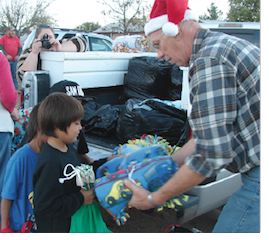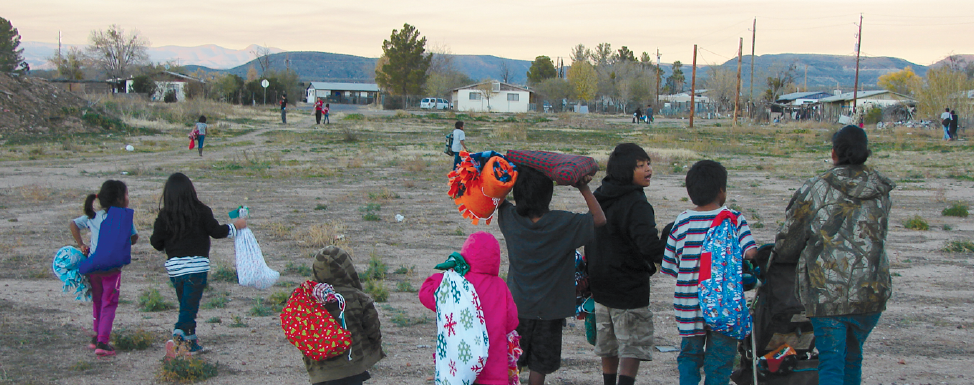By Michael P. Murphy
Imagine you live in a 1,200-square-foot home with more than 20 family members. Bad things happen here—rape, incest, alcoholism, drug abuse. Life expectancy is only around 45-50 years. The young may very well be part of a gang, and we’re talking Crips and Bloods. Add the hopelessness of endless poverty, and you have a volatile environment that is really bad for children. This is just in one house.
Unemployment in the community is at 75 percent, contrasting 25 percent at the height of the Great Depression. There are few opportunities here, so there are few jobs. Without a job most are on welfare. There isn’t enough money to pay for life’s necessities. Groceries or utilities? Which will it be? When you want to eat, you don’t pay the bills. But if you can’t pay the bills, you go without electricity and running water. What food there is in the house is taken by the adults with no regard for anyone else. Too bad, kids—they’re on their own for a meal.
Others here live in tents, shelters, or what’s left of a fire-damaged home. Throw a tarp over what’s left of the roof and call it home. Although there are many good, safe homes, far too many are like these. For $5,000 one can qualify for a FEMA trailer, but without work who has $5,000?
Their ancestors were once warriors. Now many of their descendants are disenfranchised, dependent, forgotten. One politician who toured here called it third world.
You are in Arizona—the United States of America. Welcome to life on the San Carlos Apache Indian Reservation.
Cross-Cultural Ministry
There are over 400 recognized Native American tribes in the United States and possibly as many as 200 unrecognized. Our nation’s reservations are fertile cross-cultural mission fields, yet too often overlooked. It’s important to know the backstory of what life is like beyond the superficial, beyond what we see from the highway as we drive along a reservation’s edge. We might be aware there is poverty but unaware of how devastating it truly is.
Dale and Diana Lawrence began Arizona Reservation Ministries (ARM) in 2002 to support the existing churches on the San Carlos Reservation. As longtime veterans of reservation mission work, they are prayerfully confident about why they came to work with the San Carlos Apaches—God chose it.
“One thing that is difficult for us is the number of pastors we went to Bible college with that have been quoted as saying you have to go to a foreign field in order to do cross-cultural ministry,” Diana said. “But cross-cultural ministry is less than two hours from most of those people. There are reservations that people drive through in Phoenix that would be a huge mission field.”
The key to successful mission work is learning the culture and understanding it. ARM is a ministry based on building relationships. As the level of trust grows, so does the workload.
While Dale is busy overseeing construction of a new home on the reservation and the refitting of the church bus, Diana can be found leading a weekly Bible study on the reservation or helping young couples with their birthing class. They frequently get calls for help at all hours of the day or night: An Apache couple in a city hospital an hour away needs a ride home after their child is born. A sister offers the ride, but she doesn’t have enough gas, so Diana fills her tank. Another young couple needs a ride home after having their child’s ears examined. An Apache woman’s food is stolen from her home while she is hospitalized.
There are great needs on the reservation. Daunting, to be sure, but not overlooked. “Tribal leaders are doing all they can to address these situations when they become aware of them,” Dale said. “But, with ever-shrinking budgets, the reality is that too many families live in these types of situations.”
Hope in a Bus
To bring Christ to the Apache children, the ARM church bus rolls into a different neighborhood in San Carlos four days a week offering a few hours of worship and play time. For some it is the best time of their week.

An ARM summer backpack drive collects school supplies, water bottles, and backpacks for the children before the start of school. Later each year a Christmas stocking drive collects small gifts, toys, Bibles, and personal care items from churches and individuals across the country. Volunteers fill the handmade stockings with gifts personalized for every child. For some of these children, the day they receive their stockings and fleece blankets is the only Christmas they have.
It is a wonderful sight to see. The Apache children are thrilled, sifting through their stockings before going home. Sadly, some of these happy children will return to their real world and spend that same cold night on the hard ground under a tent.
ARM welcomes work groups from across the country. For the most part volunteers help with the construction of 672-square-foot, two-bedroom homes, complete with a bathroom, a kitchen, running water, and electricity. Each home requires $25,000 in donated material. It is a happy event when a home is completed and the keys handed to its new owner, as some families have been waiting for 15 years for a home. Over the past 10 years, ARM has built 27 such houses. The need is for 1,400-1,600 more.
The Future
Residents who have found jobs are working hard, while many in Tribal Government are doing what they can to help their people. Yet many Apaches are appalled at what is happening on their reservation and have joined the ARM staff to help bring about positive change. As the staff grows and evolves, the Lawrences are able to fulfill their goal of integrating Apache Christians into the leadership of ARM. Faye Hinton is one such example.
“What we’re most happy with is the principle for starting this, to come alongside native Christians and provide resources for them to do ministry—whatever training they need,” Dale said. “To see that actually happening, like Faye, our Children’s Ministries Director, and the fruit of that is going from just two, three, maybe five kids accepting the Lord, to now nearly 100. We had 29 baptisms in 2015.”
“We’ve had almost 100 baptisms since Faye started in 2010,” Diana added. “Not just kids either. We’ve had adults accept the Lord, and it’s been fun because it’s kids and adults from work teams, as well as Apaches. Twice now, at least five or six students and their teachers from mainland China accepted the Lord on the San Carlos Apache Reservation because of short-term ministry opportunities. It’s not just about San Carlos; it’s about the kingdom.”
For the disenfranchised of San Carlos, the promise of God’s kingdom is where hope can be found. For Dale and Diana Lawrence and the staff of Arizona Reservation Ministries, they are not a forgotten people.
Learn more about this vital mission work at www.azrez.org.
Michael P. Murphy is a freelance writer in Scottsdale, Arizona.



Comments: no replies